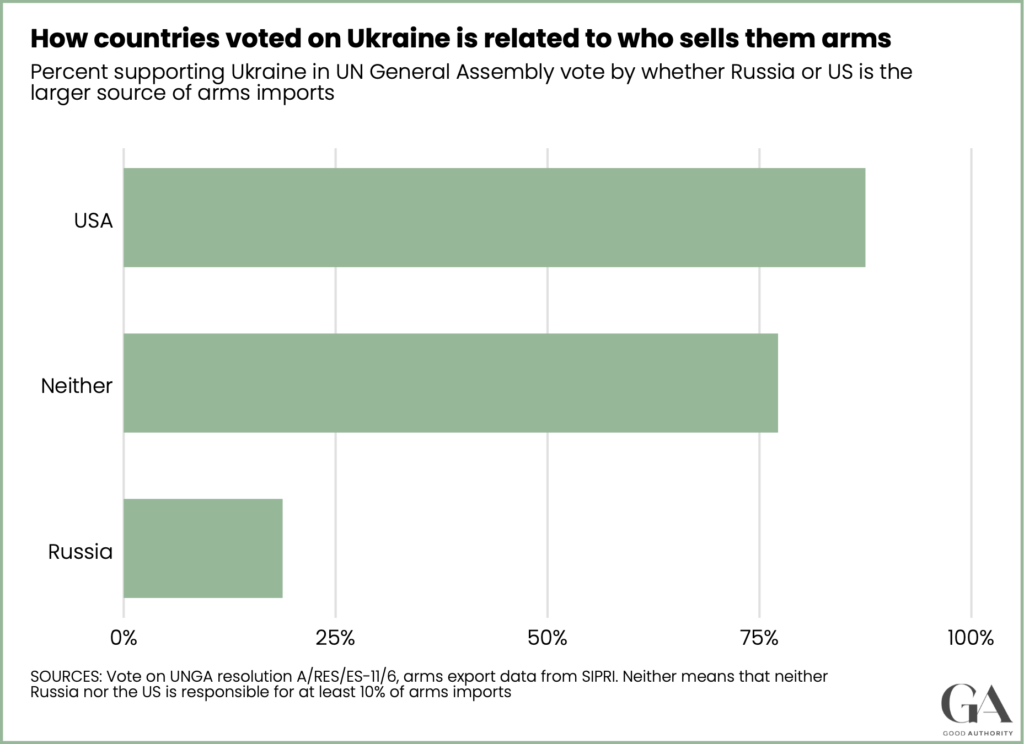During the United Nations (UN) General Assembly high-level meetings, each leader gets about 15 minutes in front of the UN’s famous green marble to speak their minds in front of a global audience. While the meetings last week were supposedly centered on the Sustainable Development Goals, many leaders, including U.S. President Joe Biden, focused instead on the war in Ukraine. Biden powerfully proclaimed:
This war is about extinguishing Ukraine’s right to exist as a state, plain and simple, and Ukraine’s right to exist as a people. Whoever you are, wherever you live, whatever you believe, that should not – that should make your blood run cold. That’s why 141 nations in the General Assembly came together to unequivocally condemn Russia’s war against Ukraine.
Ukrainian President Volodymr Zelensky similarly highlighted the overwhelming support his country enjoys at the UN:
More than 140 states and international organizations have supported the Ukrainian Peace Formula fully or in part. The Ukrainian Peace Formula is becoming global. Its points offer solutions and steps that will stop all forms of weaponization that Russia used against Ukraine and other countries and may be used by other aggressors.
Biden and Zelensky were referring to the 141 countries that affirmatively voted on a non-binding General Assembly resolution that demands that “the Russian Federation immediately, completely and unconditionally withdraw all of its military forces from the territory of Ukraine within its internationally recognized borders.” The interactive map below plots these countries alongside the 7 countries that voted no, the 32 countries that abstained, and the 13 countries that did not show up for the vote.
There are some clear regional patterns. All of Europe voted in favor, aside from Belarus and Russia. Other regions are more mixed. Many Asian countries abstained from voting, including India. In Latin America, some leftist governments chose not to support Ukraine. There is even more variation in Africa, with just about half the countries supporting Ukraine.
There are many possible explanations for why some governments sided with Russian President Vladimir Putin or were unwilling to condemn Russian aggression. One factor that stands out as potentially important are arms imports. Russia is the world’s second largest arms exporter after the United States. In 2022, after an earlier UN vote, I tweeted out a graph showing that countries that receive more arms from Russia than the United States were much less likely to support Ukraine. The graph below illustrates this for the 2023 vote: Nearly 90% of countries that import more arms from the United States than from Russia voted to support Ukraine. Less than 20% of states that received more arms from Russia voted for Ukraine. A recent working paper supports this basic insight, using regression analyses that also include other variables.

Of course we do not know whether this relationship is causal. Countries that import a lot of arms from Russia are often also close to Russia in other ways. However, analysts have long speculated that arms dependency is among the reasons why a country like India has chosen to abstain.
The war poses real issues for countries that import Russian arms. Arms imports create dependence. Larger systems, especially, require maintenance, training, and ammunition that is not easy to replace. This gives countries incentives to support Russia, or at least not upset Russia too much.
On the flip side, Russia has been unable to make some arms deliveries, including to India, while it prioritizes the Ukraine war. Russian arms exports have dropped by about one-third since 2020. India has canceled several contracts and has intensified efforts to develop its domestic defense industry. A prolonged war might further undermine Russia’s global reach as countries that depend on its defense industry may start looking for other options, which may further erode Russia’s power base.



